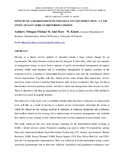| dc.description.abstract | Moving to a shared service method of operation entails a huge culture change for an organization. The entire business context must be changed. It takes time, effort and vast amounts of management energy to move from a mindset of purely decentralized management of support activities within each business unit or centralized management of support activities at the corporate level to a mindset of partnership between business units and the consolidated, shared service organization. Together with this, shared service units, despite their importance, receive much less senior executive attention than business units in most companies. The logic for this is that business divisions generate profits, and that is where top management often focuses its time. There is therefore a risk that an organization can lose its focus on shared services if the method is not shown to result in tangible benefits.
The objectives of the study were to establish whether there has been a reduction of transactional
costs at EABL as a result of moving to a shared service environment; determine the extent to
which the shared service strategy resulted in reduction in employee headcount and overheads;
find out how shared service strategy led to improvement in inventory management; and establish
how shared service strategy at East African Breweries Ltd has impacted on procurement costs.
The study employed the case study design, targeting all the departmental heads working at EABL’s shared services centre. Purposive sampling was used to select 10 respondents, among them nine departmental heads from Information Technology (IT), finance, procurement, Human Resource, EABL Kenya Demand, EABL Kenya Supply, CGI, East Africa Malt Ltd, and UDV; and one top management representative. Data was collected from the participants using a semi-structured questionnaire and an interview schedule. Qualitative and quantitative techniques were employed in data analysis. Qualitative techniques involved giving a detailed account of the impact of moving to a shared services strategy on EABL’s cost reduction efforts. Quantitative data was analyzed using descriptive statistics including percentages and frequency counts.
The study established that moving to a shared services environment has led to significant cost
reduction efforts of East African Breweries Limited. Shared services led to reduction in procurement costs, reduction in employee headcount and overheads, improvement in inventory management, and reduction of transactional costs. As such, companies running their different functions as disparate competing entities should be encouraged to adopt shared services strategy to cut costs and operate more efficiently. | en |

